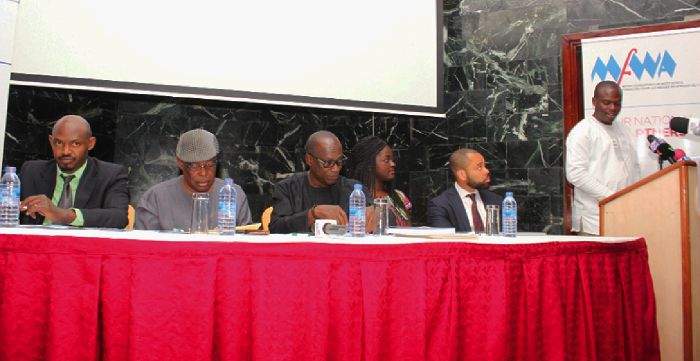
Blay-Amihere calls for national dialogue on social media
A former chairman of the National Media Commission (NMC), Mr Kabral Blay-Amihere, has called for a national dialogue on how to avert the potential threats social media pose to the country during the 2016 polls.
Advertisement
He has also advocated a national policy to regulate media content through the passage of the Broadcasting Bill by Parliament.
"The NMC must do more to regulate the media. This calls for efforts to be stepped up to ensure that the content authorisation Legislative Instrument (LI) which was meant to deal with hate speeches, incitement and all other media infractions confronting us today is passed," he added.
He made the call at a public forum held in Accra on Wednesday to discuss issues concerning the media, hate speech and peaceful election.
The forum, which was under the auspices of the Media Foundation for West Africa (MFWA), brought together stakeholders such as representatives of political parties, civil society organisations (CSOs), the National Peace Council (NPC) and media organisations.
Also present at the event were officers from the Ghana Police Service, the National Security and media regulators.
The forum, dubbed: "Issues, not insults", was meant to discuss how the media could be better positioned to report responsibly to ensure peace during the 2016 elections.
Responsible media
Mr Blay-Amihere observed that although the Constitution guaranteed free speech and freedom of the media, it was important for the media to be responsible in the way those freedoms were exercised.
In that regard, he called on professional bodies such as the Ghana Journalists Association (GJA) and the Ghana Independent Broadcasters Association (GIBA) to self-regulate in order to ensure that media practitioners adhered to professional standards.
He said there was the need for media literacy on how to report in a manner that would be devoid of the use of divisive, discriminatory, inflammatory and hate speech.
Responding to the public declaration by the Inspector General of Police of a possible closure of social media on the day of election, Mr Blay-Amihere said the issue was quite sensitive and needed collaborative efforts by stakeholders through dialogue and engagement.
He said social media were tools for mobilisation and accountability and that if principles and guidelines were followed, they would be useful tools that would facilitate the electoral process.
Editorial policies
For his part, the Director of Article 19, East Africa Office in Kenya, Mr Henry Maina, said it was important for editors of media organisations to be educated on what constituted hate speech, so that they could prevent it from being put in the public domain.
He observed that there ought to be a line of distinction between political ownership of media organisations and professionalism by journalists who plied their trade in those organisations.
"Media must be run by professionals. It can be owned by business people and politicians, but the editorial policies should be the responsibility of professionals," he said.
He said hate speech, stereotypes, alarming and sensational headlines and inflammatory messages were mostly put out by media organisations that had links with politicians, a situation which, he said, ought to be examined critically in the interest of the country.
The Executive Secretary of the Rwanda Media Commission, Mr Emmanuel Mugisha, said the media were tools for nation building but could become tools for destruction if not properly utilised.
Citing the role the media played in fanning the Rwandan genocide of 1994, he urged media practitioners and media owners to be wary of what they used their platforms to do.
"Hate speech is not and can never be free speech and should never be accommodated. Just for a few wrongly used words by the media, more than a million people were killed in 100 days in Rwanda. Ghana must not get to that point. It is not a good experience," he warned.
He said integrated media training and practices should be encouraged.
He also urged media training institutions to research into hate speech and incorporate it into their training programmes.
The Public Policy Manager of Facebook, Africa, Ms Akua Gyekye, said she did not support the idea that Facebook should be shut down on the day of elections.
She said the social media platform had come out with an initiative to detect and remove all derogatory content put on it.
She, therefore, supported the idea of a national dialogue on how to use the platform.
IGP
During a visit to Koforidua last week, the Inspector General of Police (IGP), Mr John Kudalor, reiterated his conviction that social media should be shut down on election day to promote peace and ensure sanity in the general election.
According to him, social media had been a haven where people churned out a lot of half truths, lies, among other vices, just to deceive people.
Addressing personnel of the Ghana Police Service in Koforidua as part of a two-day tour of the region to ascertain the plans and preparations towards Election 2016 in the Eastern Region, Mr Kudalor said social media should not be used for anything that had the propensity of causing fear and panic but rather be used effectively.
He gave an assurance that the Police Administration would continue with the educational drive towards the elections, so that information on social media would be beneficial to all.



